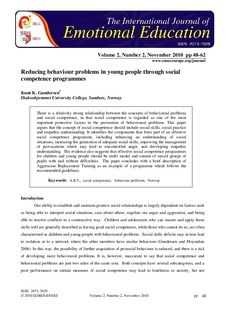| dc.description.abstract | There is a relatively strong relationship between the concepts of behavioural problems and social competence, in that social competence is regarded as one of the most important protective factors in the prevention of behavioural problems. This paper argues that the concept of social competence should include social skills, social practice and empathic understanding. It identifies the components that form part of an effective social competence programme, including enhancing an understanding of social situations, increasing the generation of adequate social skills, improving the management of provocations which may lead to uncontrolled anger, and developing empathic understanding. The evidence also suggests that effective social competence programmes for children and young people should be multi modal and consist of mixed groups of pupils with and without difficulties. The paper concludes with a brief description of Aggression Replacement Training as an example of a programme which follows the recommended guidelines. | en_US |
